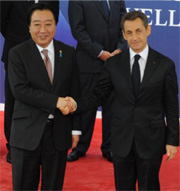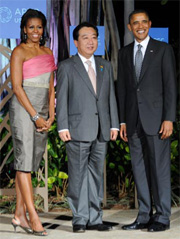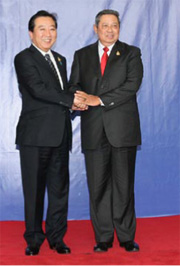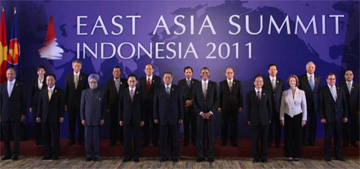Home > Highlighting JAPAN > Highlighting Japan DECEMBER 2011 > PM Flies the World for Summits
Highlighting JAPAN
PRIME MINISTER’S DIARY
PM Flies the World for Summits

Prime Minister Noda is welcomed by French President Nicolas Sarkozy, chair of the G20 Summit, November 3
G20 Cannes Summit
On November 3 and 4, 2011, Prime Minister Yoshihiko Noda attended the G20 Summit on Financial Markets and the World Economy and the G20 Cannes Summit held in Cannes, France.
At the Cannes Summit, the leaders of the G20 nations formulated the Cannes Action Plan for Growth and Jobs, which summarizes the measures to be adopted by each, on the shared recognition that in order for the world economy to attain solid, sustainable, and balanced growth, re-balancing (from external demands to internal demands, from public demands to civic demands) needs to be pursued in the medium to long term while addressing the current issues on a short-term basis, including the financial crisis in Europe. Prime Minister Noda praised the agreement reached by the European nations in October. However, he also stated that the agreement needs to be executed, and that Japan is willing to cooperate on the premise that the European nations remain united. The Prime Minister then commented that Japan is doing its utmost to recover from the damage caused by the earthquake and tsunami, but that there is a risk of an economic slowdown due to the historic rise of the yen, and that cooperation is needed to stabilize foreign exchange rates. He also noted Japan’s determination to achieve fiscal soundness, and explained the specific plan for unified reforms on social insurance and tax systems, including the stepped raising of consumption tax, and that the necessary draft bills will be submitted by the end of fiscal 2011. At the same time, the Prime Minister emphasized the fact that Japan will draw up strategies for reviving the country and promoting economic growth and the restoration of fiscal health as two wheels of a car. He also highlighted the need to utilize the loan systems of the International Monetary Fund (IMF) and implement measures through a regional framework to prevent the crisis from spreading to emerging economies.
The leaders of the G20 nations agreed that trade plays a decisive role in growth, and highlighted the importance of eradicating protectionism. With regard to the WTO Doha Round, instructions were issued to the effect that each nation should discuss new approaches for advancing negotiations at ministerial meetings. In addition, the leaders of the G20 nations agreed on the importance of food security. In this regard, the Prime Minister mentioned the following four points: making contributions for enhancing the transparency of the agricultural product markets through the ASEAN Food Security Information System (AFSIS); offering emergency aid amounting to 50,000 US dollars to Thailand through the ASEAN+3 emergency rice reserve agreement; cooperating in enforcing the bonds between ASEAN nations; and hosting the Fifth Tokyo International Conference on African Development (TICAD) in 2013.
Regarding the financial regulations, many leaders highlighted the importance of financial regulation reforms. The Prime Minister indicated his appreciation for the progress of the reforms, while highlighting the fact that diverse measures need to be implemented in addition to the strengthening of capital regulation, and that matters agreed previously need to be enforced steadily, including the regulations on over-the-counter derivatives. When Prime Minister Noda attended the G20 Summit on Financial Markets and the World Economy held prior to the G20 Summit, he spoke about the lessons learned from Japan’s experiences, and highlighted the need for financial regulation reforms that take into consideration the following four points, which were supported: (1) strengthening the financial sector in Europe; (2) measures for developing efficient liquidation procedures; (3) an appropriate balance between financial regulations and consideration for growth; and (4) the world economy. He thereby mentioned the four issues facing the financial sector.
Through these debates, the leaders of the G20 nations agreed on the Communiqué, the Cannes Action Plan for Growth and Jobs, and the Final Declaration.

Prime Minister Noda is welcomed by President and First Lady Obama at the APEC leaders’ banquet, November 12
APEC
On November 11 (local time), Prime Minister Noda visited Honolulu (USA) to attend the APEC Economic Leaders’ Meeting on November 12 and 13. Hosted by U.S. President Barack Obama, discussion during the leaders’ meeting focused on growth and job creation, regulatory reform and competitiveness, and energy efficiency and energy security.
On the subject of growth and job creation, the Prime Minister announced that Japan had decided to enter into consultation toward participating in the Trans-Pacific Partnership (TPP) negotiations with the countries concerned, and outlined his views and potential measures on the world economy, and described Japan’s economic growth strategy.
During the session on energy efficiency and energy security, as the keynote speaker, Prime Minister Noda illustrated (1) Japan’s commitment to achieving world-leading levels of energy efficiency through energy saving initiatives, (2) challenges facing Japan’s energy policy for the future, and (3) the potential for energy-related cooperation within the Asia-Pacific region.
At the press conference on November 13, the Prime Minister commented that the APEC meeting had made the following three achievements. He said, “Firstly, we agreed on the common rules for fostering innovation without distorting trade, as well as on efforts to spread Environmental Goods for “green growth” to bring about economic growth across the region.
“Secondly, we agreed on establishing targets for improving energy efficiency in the entire APEC region. Upon the request of the APEC chair, U.S. President Barack Obama, I led the discussion by explaining Japan’s past experiences and lessons learned thereof, as well as our future challenges.
“Thirdly, regarding the TPP, which is the only pathway toward the realization of a Free Trade Area of the Asia-Pacific (FTAAP) for which negotiation has been launched, I explained that Japan will enter into consultations toward participating in the TPP negotiations with the countries concerned, and several economies expressed their welcome.”

Prime Minister Yoshihiko Noda is welcomed by President Susilo Bambang Yudhoyono of Indonesia, November 18
ASEAN-Japan Summit
On November 18 (local time), Prime Minister Noda attended the 14th ASEAN-Japan Summit Meeting, with the leaders of the ten ASEAN member countries, the 14th ASEAN+3 Summit Meeting with ten ASEAN member countries plus Japan, China and the Republic of Korea (ROK), and the 3rd Japan-Mekong Summit Meeting in Bali, Indonesia.
At the 14th ASEAN-Japan Summit Meeting, the Prime Minister expressed his deep sympathies to Thailand, Cambodia, Myanmar, Vietnam, Laos and Philippines for the damage caused by natural disasters and offered to extend as much assistance as possible. He also expressed his gratitude for support given by ASEAN member states in the aftermath of the Great East Japan Earthquake and stated that Japan would move ahead forcefully with its restoration work.
He also said Japan would actively support ASEAN in building an ASEAN community in 2015. At the same time, he explained that Japan is also dealing with the enhancement of ASEAN Connectivity at the ministerial level as a priority issue. In this connection, he assured that Japan would extend assistance focusing on improvements of the “Formation of the Vital Artery for East-West and Southern Economic Corridor” and “Maritime Economic Corridor,” as well as projects of software infrastructure, throughout the ASEAN region as its pillars.
As a means to strengthen cooperation in the area of disaster management, Prime Minister Noda said Japan would help the ASEAN Coordinating Center for Humanitarian Assistance on Disaster Management (AHA Center) to develop as a regional hub of disaster management. At the same time, he said Japan would launch efforts to implement a “Disaster Management Network for the ASEAN Region.’’
The Prime Minister touched on youth exchange, saying the “Japan-East Asia Network of Exchange for Students and Youths” (JENESYS) program had made significant achievements, adding that youth exchanges constituting a basis for ASEAN-Japan relations remained important. He explained that Japan was considering the possibility of realizing exchanges among about 3,000 young people in Japan and ASEAN during the period to the end of 2013.
At the conclusion of the Summit, Indonesian President Susilo Bambang Yudhoyono declared a new joint declaration and plan of action, adopted for the first time in eight years since the Tokyo Declaration and the ASEAN-Japan Plan of Action were adopted in 2003.

Group photograph before the East Asia Summit (EAS) Meeting, November 19
East Asia Summit
On November 19 (local time), Prime Minister Noda, in Bali in Indonesia, attended the East Asia Summit (EAS), which Russia and the United States were present for the first time this year.
Having welcomed the participation of the United States and Russia at the EAS, the Prime Minister stated Japan would like to develop the EAS as a Leader-led forum to affirm common vision in the region and basic rules, through existing practical cooperation and strengthening political and security efforts, and implement concrete cooperation.
Prime Minister Noda referred to the sea as a public good connecting the Asia-Pacific region together, and stated that he understands that the importance of basic rules relating to the seas, including the peaceful settlement of disputes, freedom of navigation and adherence to international law such as the UN Convention on the Law of the Sea (UNCLOS), is shared by all of the EAS member countries.
From trade and economic perspective, the Prime Minister said that he hoped to establish a new working group under both the East Asia Free Trade Agreement (EAFTA) and the Comprehensive Economic Partnership for East Asia (CEPEA) as soon as possible, and to accelerate discussions regarding liberalization of trade and investment in East Asia.
He also mentioned that he wants to establish low-carbon growth models through the “East-Asia Low Carbon Partnership” initiative and asked for support as JAPAN is going to host a dialogue meeting in Tokyo next April under the initiative.
© 2009 Cabinet Office, Government of Japan






